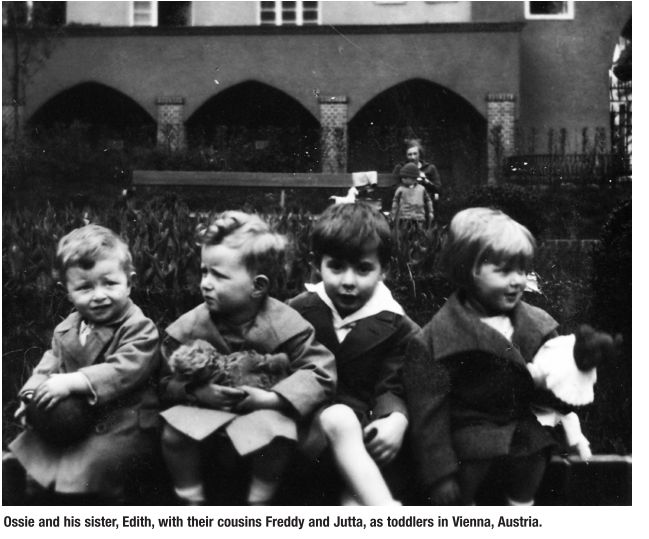
“It was like therapy for Dad,” recalls Cour. “It allowed him to remember his feelings, and to tell things even I didn’t know. I did the typing, but it’s Dad’s story, from start to finish.”
Langfelder was born in 1926 to a Lutheran mother and a Jewish father in predominately Catholic Austria. His father managed a manufacturing company and his mother had been a private secretary in a law firm until the birth of his only sibling, his sister Edith. The Langfelders lived in the same comfortable, four-story apartment building as other relatives, and Ossie says his memories of his youth are vivid because of the extraordinary circumstances of wartime Europe.
“I remember my father’s drawn face when he spoke of the Germans or used the word ‘Nazi.’ Not until April, 1938, did I realize what fear really meant. That was the fateful day on which Hitler’s troops marched into Vienna.”
Langfelder relates the cruelty he witnessed. Looking out his family’s apartment window he saw well-dressed Jewish women, wearing fur coats and jewels, forced to scrub the sidewalks while soldiers and the Jewishhating public sprayed them with lime and other harsh chemicals.
“Although our mother tried to shield us from seeing these cruel events, it was unavoidable. I never realized that shortly thereafter, the women would all be sent to concentration camps to be annihilated.”
In the book, Langfelder relates how he clutched his father’s hand and the two walked for hours in a circuitous route to avoid detection, making their way to the Argentine Embassy in hopes of securing visas to leave Vienna. By luck, someone whispered a warning to his father and they fled. Later they found out that everyone in the line had been arrested.
Shortly after Langfelder’s father went into hiding at a relative’s house, Ossie and his sister were sent to a school for children of Jewish parents. “Little did we realize that most of those children would be sent to concentration camps.”
Langfelder credits his mother’s German ancestry and her elegant blond, blue-eyed good looks with helping the family obtain visas that eventually got them out of Austria and on to Switzerland and then to London. He still doesn’t know how she accomplished it. Once visas were issued, the family had just three days to leave
Austria, or be sent to Dachau prison camp. The Langfelders packed very
little and said nothing to friends, pretending instead they were merely
going on a weekend holiday.